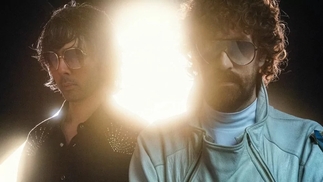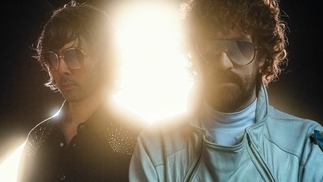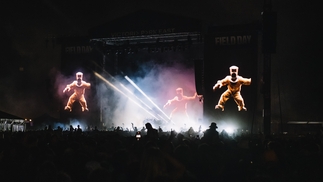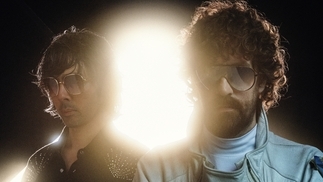DJ MAG MEETS JUSTICE TO TALK SYNTHS, CLASSICAL MUSIC & THEIR NEW ALBUM
Xavier de Rosnay & Gaspard Augé speak up...
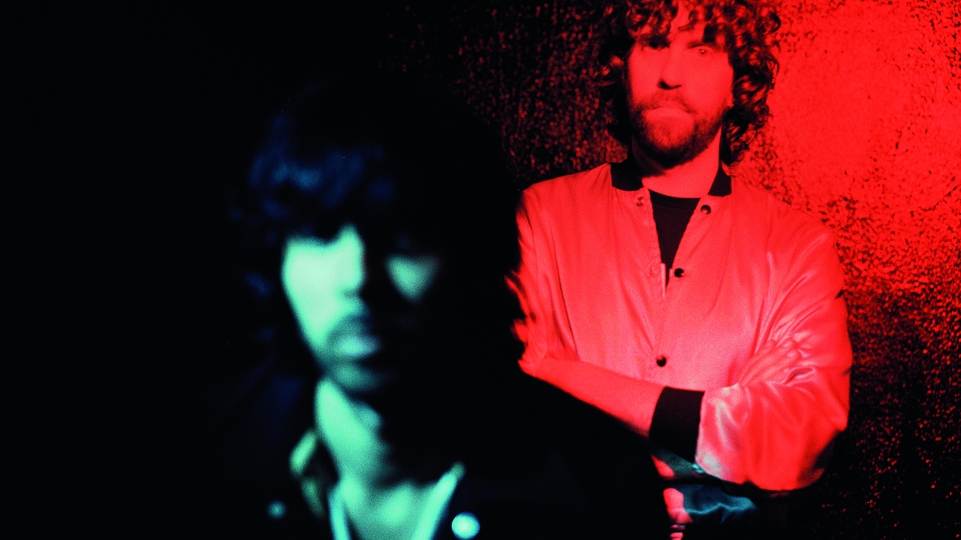
The analogue synth craze is out of control. It’s hit its apex with SURVIVE’s John Carpenter-style soundtrack to Netflix sci-fi show Stranger Things. Now everyone’s jumping on the synth bandwagon. There are retro synth-wave acts cropping up all over. French enfant terribles Justice, though, are happy to be the iconoclasts and think the opposite.
“We love what you can do with a computer,” shrugs Xavier de Rosnay, the duo’s mouthpiece. “There are possibilities you couldn’t dream of in the best studio in the world with analogue equipment. We are not obsessed with synths. A synthesiser is a synthesiser. Some of them are great, but most of them sound very like music from the past. What’s modern, what’s new, comes from other things.”
Justice's attitude doesn’t come as a huge shock. Xavier and his studio partner Gaspard Augé have never followed fads. Since their first record they’ve led from the front. 2007’s ‘†’ was a scuzzy hit of hard rhythmic noise — disco and electro shredded and spat out through a dirt-encrusted, distorted rock filter. It fit their metal image of black leather jackets and skinny jeans to a tee, and had hooks for days.
A key release of the nu-rave/electro/blog house era, ‘†’ was a touchstone for a new generation of kids raised on the records of DFA and Soulwax, who saw no distinction between genres, and weren’t interested in the music tribalism of the past. It made them dance music superstars: maybe not household names, but festival headliners, and capable of filling a stadium or two.
‘Audio, Video, Disco’, the follow-up, saw them ditch their signature sound and crank up the rock dials to pursue their 1970s prog rock dreams, with all the bluster that entailed, though it lacked the vitality and freshness of their first.
After a period of hibernation, the electro fuzz deviants have returned to the vanguard with a new album. ‘Woman’ has a more danceable sound that nods to their beginnings but irons out the gnarly rock kinks in favour of a pristine disco sheen. Just as the cover depicts their famous cruciform logo with a splash of rainbow colour across it, the album is drenched in bright pigments. The first taster ‘Safe & Sound’ is all choir vocals, dexterous slap bass, keyboard sweeps, huge orchestral strings and audacious chord changes, building to an acid crescendo. It draws the French disco line from Cerrone and Space to Daft Punk up to Justice themselves, and heard on the radio, it’s unmistakably them.
“I guess we can’t help doing things that sound like us”
Xavier says. “There are definitely some elements we never get rid of, and also a sensitivity, a way of making things that is maybe our thing.”

DISCO TILT
It’s been five years since ‘Audio, Video, Disco’, a time in which the band have toured and “enjoyed life, seeing friends and family”. They started working on ‘Woman’ in 2015, though the record’s disco tilt wasn’t intentional, Xavier claims. “We made this record in a very natural way and didn’t think too much about its shape. We were just liking the songs, and naturally it’s maybe more danceable. We let everything flow, and this is how it ended up being. Some songs have rock & roll elements, some have baroque elements, some are more disco or funk.”
There are several vocal guests. French singer Romuald and Zoot Woman’s Johnny Blake lend their pipes, while Morgan Phalen, former lead vocalist of Diamond Nights, crops up on two of the album’s biggest tracks, ‘Pleasure’ and first proper single ‘Randy’.
Phalen, whose own band shared some of the stadium drama and theatricality of Justice, is an ideal foil. Having appeared with the band before on ‘Audio, Video, Disco’, he was a natural choice. “We get along, and also his voice fits perfectly with the music we make,” Xavier says. “So it felt very natural when we started working on the record to call him again, we could go farther than what we started to explore on ‘Audio Video Disco’.”
While there’s a familiarity to the sound, Justice have been more ambitious on ‘Woman’. They worked with the London Contemporary Orchestra over several tracks, and these strings add grandeur and some disco pizazz to the pudding. In addition to the instrumentation, it’s the LCO’s voices that can be heard as the choir on ‘Safe & Sound’.
“It was great working with them, ’cause they were very efficient,” Xavier observes. “One of the things that was amazing is that the orchestra is mainly made up of people in their twenties. This made the communication easier. Also, it’s the first generation of classical musicians that have an ear to pop music, and music we listened to. That makes a big difference. It was great.”
DIGITAL MEANS
As the pioneers of their first label Ed Banger’s electro sound — a noisy late noughties hybrid that thrilled dancefloors in the UK, Paris, the US and beyond for some years — Justice felt like originals. They inspired a wave of acts that had a similar outlook. For them, it wasn’t about the same clichéd influences. They weren’t claiming a filial connection to Detroit or Chicago.
Instead, as well as ’70s Italian horror soundtrackers Goblin (who they sampled on early track ‘Phantom’ and American disco legends Chic, they drew inspiration from modern French mavericks, people who saw the endless possibilities of musical technology, rather than being hung up on the authenticity of analogue synths.
“Two electronic records that influenced us the most in the early 2000s were made completely on computers, on a laptop — Mr Oizo’s second album ‘Moustache (Half A Scissor)’, and Jackson & his Computer Band’s first album, ‘Smash’. This is total laptop music, and they were the first records exploring what you can really do with digital means,” Xavier claims.
These digital means they’ve returned to again on one of 'Woman'’s best moments. If other tracks suggest a smoother, more ‘mature’ Justice, the instrumental ‘Chorus’ is one of their rawest tracks so far, an indication that they haven’t entirely ditched the grot and grunge of their earlier work. A heavy techno track in form, its abstract noise Xavier says was the result of experimentation rather than jamming with live instruments, as was the case on some of the other songs.
“We made this track maybe halfway through the recording of ‘Woman’. We had already written five songs and had an idea of what the album was going to be, and we needed to break the main idea and main feeling of the record, and create something else for excitement. It’s important, because asking people to take one hour of their time to listen to an album is a lot. Even for us, working on and listening to it, we sensed that at this moment, we needed to go into something more electronic, harsher.
“This song is one of only a couple that we started from experimenting with software,” he continues. “Instead of doing like we did with most of the tracks, writing them with a piano and bass or guitar and bass, ‘Chorus’ we started with a computer, manipulating and recording everything, and then taking pieces that we liked and getting more abstract and free-structured.”
BAROQUE ‘N’ ROLL
Throughout ‘Woman’, Justice have broadened their musical scope. While disco dominates, classical is a considerable influence too, especially on the track ‘Heavy Metal’. A baroque twist of electro beats and Beethoven, its overblown riff brings to mind a poodle-haired rocker head-banging with a keytar — a feeling last evoked by Daft Punk’s ‘Aerodynamic’. Quizzed on this influence, Xavier becomes animated, talking of classical’s irreducible influence on pop.
“For everybody in the Western world, classical music is very present,” he says.
“Everybody has been exposed to hundreds of classical music pieces, it’s part of everyone’s sensitivity. For us it’s very powerful, maybe the most powerful music in the sense that without drums and without vocals, without a chorus, you can still manage to make what has had a sensory effect on people for centuries.
“The way we use it is our take on classical music, but in a very simple way. Not pretentious,” he goes on.
“We don’t use it because it’s intelligent or whatever, but because it conveys really strong emotions in a harmony that we like"
"It’s a blend of classical music, but it sounds like it’s made by computers. Very quantised, like the [Wendy Carlos] ‘Clockwork Orange’ soundtrack.”
More song-based than before, with slicker production and less noise, it does sound like, ‘Chorus’ notwithstanding, Justice are growing up. They’re no longer the snotty, Ramones-alike punk bad boys lurking with cruel intent. They’ve got their eyes on a different prize. The closing track of ‘Woman’, for instance, the meandering ‘Close Call’, is the closest they’ve come to ambient, more like Air than a bona fide dance act.
“This type of music, that is slow and mellow, a bit ambient, there were some elements of that before, but maybe not pushed as far as on this track,” Xavier admits. “We felt in a weird way, when we were writing it, that we were doing a classic Justice track, because of the harmonies. To us, that is in the continuity of what we’ve done before, and maybe the arrangement and the way it’s produced make it sound different, but that’s how it goes every time we make a new album.”

DANCE
It does make you wonder whether or not they see themselves as a dance act at all anymore. Whether they’re happy to be categorised in this way. “It would be weird to say we have nothing to do with dance music, but at the same time we are not really a dance music band,” Xavier says. “We have one foot in both territories. We have no problem being categorised as a dance music act because of course it opens a lot of possibilities for us, but we believe on albums it’s not total dance music, as most people will think of it.”
‘Woman’ is probably their second strongest record and it’s bound to bathe them in adulation when they take it out on the road in the near future. The band, despite attracting controversy when during a DJ set in 2008 Augé was allegedly playing with an unplugged Akai MPD24 (something strenuously denied), are a very confident live act. They have already recorded two live albums, ‘A Cross The Universe’ and ‘Access All Arenas’. Work is underway on a new live show, but Xavier refuses to say more than “it’s too early to talk about it”. If it’s anything like the new record, it will be a dazzling spectacle sure to satisfy their fans, and win them a few more. Until then, Justice will continue to do their own thing: just like they’ve always done.
“It doesn’t mean we will make the same music all our lives,” Xavier says, “but the elements of this music we take all the time with us, and we try to transport, it’s always the same thing we listened to when we were teenagers.”
